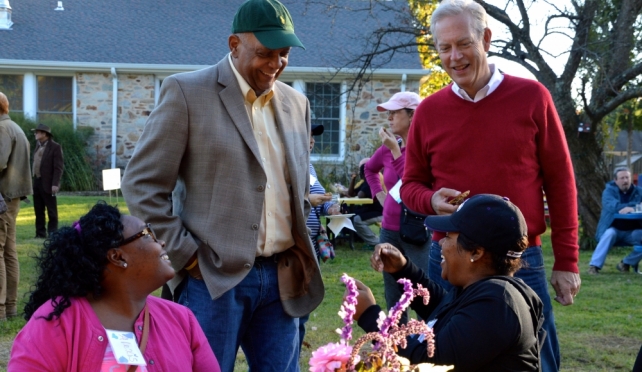Dr. Gregory E. Thornton is Chief Executive Officer of the Baltimore City Public Schools (BCPS). Below he shares his personal experiences of working on a farm while growing up, his passion for the educational opportunities made possible through Great Kids Farm, and plans to expand the Farm’s impact in the years ahead.
You seem at home at Great Kids Farm. What has been your relationship with farming and/or farm-based education?
It’s true. I feel very much at home at Great Kids Farm. I grew up in Philadelphia on a block with 60 row houses. In the summers, my mother would send me to my grandfather’s farm on Maryland’s Eastern Shore. There, I learned about biology and ecology. I grew corn and fed cows. The night sky was one of the most amazing things I’d ever seen. The farm was an exciting place. You could experiment; you could innovate. I was able to apply what I learned there to my everyday life. When you have an investment in a harvest, you have a stake in the outcome. It made me appreciate the value of work. Farms are hard work. It’s not easy.
What excites you most about the mission of Great Kids Farm?
I believe every youngster needs the experience of getting in touch with who they are, and what excites them. Farming makes learning come alive. That’s the whole point of our Learning Journeys, where students are exposed to the richness of our community. We asked ourselves, what are the things we want our kids to take away beyond their K-12 classroom experience? What are the lifetime interests we can nurture that they can build on and pass on to their children? As a result, now you have 6th graders learning about art at a museum. You have 12th graders attending a symphony for the first time. The same is true for Great Kids Farm. Seventh grade students will now visit and learn about the life of plants, and where their food comes from.
As 7th graders embark on their ‘Learning Journeys’ at the Farm, do you have advice for them?
My advice to them is to touch the soil, smell the plants. Don’t be afraid to get dirty. I want them to understand it’s not just about walking through a field. It all ties back to biology, to ecology, to chemistry, to all the sciences, and other subjects you learn at school.
These students have a chance to be in a living laboratory and to have authentic learning experiences that will stay with them for a lifetime. There’s an excitement and satisfaction that comes with growing things. They’ll become more confident through seeing the fruits of their efforts. These are the experiences we’re hoping to create in the minds and hearts of kids.
Friends of Great Kids Farm offers individuals and organizations the opportunity to support efforts to connect students to experiential learning and healthier foods. What role do such efforts play in the school system's efforts to prepare students for productive futures?
Great Kids Farm is a jewel in our community. And there’s a lot we can do to make it shine even brighter. Ensuring our children develop into productive citizens and caring adults is everybody’s responsibility. You need the community to help. Friends of Great Kids Farm understands this and provides opportunities for people and organizations to contribute resources, and their time as volunteers. We know that when people and partners come together—that when the investment is greater—you’ll achieve a bigger impact. If we want a skilled labor force in the future, you need to provide opportunities for kids to develop work-based skills now. This is another important role the Farm plays.
How does the Farm fit within the school system's long-term vision?
We’re working to create a community that values good food and proper nutrition as a pathway to a lifetime of healthy living. One of the challenges we face as a city is access to healthy foods. Thanks to our community partners, kids can now go home with food once a week. Our cafeteria staff is serving fresh fruits and vegetables, including produce grown at the Farm. We’re looking at our students as a way of encouraging healthier behavior among adults. Through the 21st Century Schools initiative, green space will be a feature of every school site. As each new school comes on board, we’ll be working with them to develop their plans for a schoolyard garden. The Farm is advising and contributing to these efforts as a hub in the center of a spoke system of schools. At the end of the day, our community will all the better through efforts like these. The experiences we create for kids is something they’ll remember for years to come and integrate into their daily lives.
What's your favorite vegetable and/or fruit?
I don’t have just one. Thanks to being raised on a farm, I eat vegetables every day. Leafy greens. Kale. Turnips. I love biting into a tomato the way some people like biting an apple. I’ve enjoyed good health because of my eating habits. If we can get more kids eating healthy, the chances they’ll sustain good health throughout their lives will be all the better.


